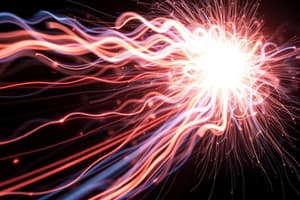Podcast
Questions and Answers
Define force in physics.
Define force in physics.
Force is a push or pull on an object, a vector quantity with magnitude and direction.
What is acceleration and how is it defined?
What is acceleration and how is it defined?
Acceleration is the rate at which an object changes its velocity, calculated as the change in velocity divided by the change in time.
Explain the concept of speed.
Explain the concept of speed.
Speed is the magnitude of an object's velocity, reflecting how fast it is moving.
What is velocity in physics?
What is velocity in physics?
How is work done defined in physics?
How is work done defined in physics?
Can you give an example of how force can change an object's motion?
Can you give an example of how force can change an object's motion?
What is the formula to calculate power?
What is the formula to calculate power?
What is the unit of power and its equivalent?
What is the unit of power and its equivalent?
Explain kinetic energy in terms of velocity and mass.
Explain kinetic energy in terms of velocity and mass.
What is the formula for potential energy due to gravity?
What is the formula for potential energy due to gravity?
What does elastic potential energy depend on?
What does elastic potential energy depend on?
How is kinetic energy related to speed?
How is kinetic energy related to speed?
Study Notes
Basic Physics: Force, Acceleration, Speed, Velocity, Work Done, Power, Kinetic Energy, Potential Energy
Force
In physics, force is a push or pull on an object. It is a vector quantity, meaning it has both magnitude and direction. The unit of force is the Newton (N), named after Sir Isaac Newton, who discovered the laws of motion. Force can change an object's motion, velocity, and direction.
Acceleration
Acceleration is the rate at which an object changes its velocity, defined as the change in velocity (Δv) divided by the change in time (Δt). It is a vector quantity, and its unit is meters per second squared (m/s²). Acceleration can be caused by an external force acting on an object.
Speed
Speed is the magnitude of an object's velocity, which is the rate at which it is moving. It is a scalar quantity, meaning it only has magnitude and no direction. The unit of speed is meters per second (m/s).
Velocity
Velocity is an object's speed and direction of motion. It is a vector quantity, and its unit is meters per second (m/s). Velocity can be positive or negative, depending on the direction of motion.
Work Done
Work is the energy transferred to an object by a force acting on it. It is the product of the force (F) and the displacement (d) of the object, in the direction of the force. The unit of work is the joule (J), which is equivalent to one kilogram-meter (kg·m).
Power
Power is the rate at which work is done. It is defined as the work (W) done divided by the time (t) it takes to do it. The unit of power is watts (W), which is equivalent to one joule per second (J/s).
Kinetic Energy
Kinetic energy is the energy an object possesses due to its motion. It is directly proportional to the square of the object's velocity and is defined as 0.5 times the mass (m) of the object multiplied by the square of its velocity (v²). The unit of kinetic energy is joules (J).
Potential Energy
Potential energy is the energy an object possesses due to its position or configuration. There are two main types of potential energy: gravitational potential energy and elastic potential energy. Gravitational potential energy depends on the mass (m) of the object, the gravitational acceleration (g), and the height (h) above the ground, while elastic energy depends on the rigidity (k) of the object and the change in length (Δx) of the object.
In conclusion, these fundamental concepts of force, acceleration, speed, velocity, work done, power, kinetic energy, and potential energy are crucial in understanding the basic principles of physics. They describe the behavior of objects in motion and the energy they possess, allowing us to predict and analyze physical phenomena.
Studying That Suits You
Use AI to generate personalized quizzes and flashcards to suit your learning preferences.
Description
Explore fundamental concepts in physics including force, acceleration, speed, velocity, work done, power, kinetic energy, and potential energy. Learn about the definitions, units, and significance of these concepts in understanding the motion and energy of objects.




